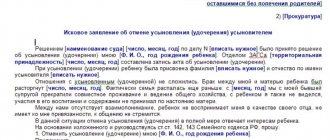Home / Family law / Adoption and guardianship
Back
Published: 08/17/2018
Reading time: 7 min
1
674
According to Russian law, full civil capacity occurs at 18 years of age (and in certain cases even at 16). However, in certain cases, an adult may no longer control and be responsible for his actions. In order to avoid harmful consequences for himself, his family and those around him, such a person may be declared incompetent.
- Who can file an application for incapacity?
- The procedure for recognizing incapacity
- Recognition of an elderly person as incompetent
- The procedure for declaring incapacity
- Declaring a person with dementia incompetent
- How to apply for guardianship Where to apply
- Documentation
- Requirements for a guardian
In what specific cases can you exercise this right and how exactly to do this?
Who can file an application for incapacity?
An application requesting that an individual be declared incompetent may be submitted by:
- the person involved in the statement himself , if he really considers himself incompetent;
- any member of his family or relative (regardless of whether they live together or separately);
- guardianship authority;
- representative of a psychiatric or addiction medicine center.
The application is submitted to the district court at the place of residence of the potentially incompetent person or at the location of the medical institution where he is being treated.
Payments and benefits
For those who officially provide care for an incapacitated person, state accruals (benefits) are provided on the territory of the Russian Federation, as well as regional accruals depending on local regulations. In practice, an official allowance of three and a half thousand rubles is provided for the care of a disabled person of the first group. In the case of disabled people of the second group, the payment amount is equal to two and a half thousand rubles. Additionally, provision is made for the payment of a social pension for an incapacitated person, which is established depending on the group and the presence of dependents, but cannot be less than the subsistence level. Some municipalities provide additional charges.
The procedure for recognizing incapacity
All the main provisions concerning the incapacity of citizens are spelled out in Articles 281-286 of the Civil Procedure Code of the Russian Federation. It is on them that the court will rely when considering the case. In particular, the following factors will be taken into account:
- presence of a mental disorder;
- the presence of a cause-and-effect relationship between a mental disorder and the citizen’s inability to realize/control his actions;
- the presence of evidence of the citizen’s inability to control his actions and understand their meaning;
- a citizen has reached the age at which the question of declaring him incompetent can be raised.
The following types of documents can be used as evidence of incapacity:
- verdict of a forensic psychiatric examination (appointed in almost 100% of cases if there is a mental disorder);
- certificate stating that the person is registered in a mental hospital;
- certificates from medical institutions where the person is regularly observed;
- MSEC certificate;
- written confirmation that a person is not able to control his actions (materials from investigative bodies, testimony of witnesses).
Please note that a forensic psychiatric examination may be ordered more than once during the consideration of the case.
If the defendant evades undergoing it, the court may decide to send him for an examination forcibly.
Why does grandma need a guardian?
Expert opinion
Stanislav Evseev
Lawyer. Experience 12 years. Specialization: civil, family, inheritance law.
Grandchildren and children are obliged to help their elderly relatives both physically and financially. If loved ones refuse to provide support, powers may be forcibly assigned.
For example, alimony can be collected from grandchildren by court decision. The initiator of an appeal to the court can be the grandmother herself (if she has full legal capacity) or her guardian (if the woman is deprived of legal capacity).
If the grandmother only needs physical help (cleaning, cooking, going to the store), then it is necessary to apply for patronage. This is an official form of care for persons over 80 years of age and group 1 disabled people.
A prerequisite for the appointment of patronage is the need for constant outside care and reaching the age of 80 years.
If the grandmother cannot understand the consequences of her actions (abused alcohol, used drugs, has a mental illness), then it is necessary to raise the question of depriving her of legal capacity.
If this issue is not resolved in a timely manner, the woman may become a victim of scammers who will deprive her of her living space. It may also cause damage to the property or health of third parties. To avoid such troubles, it is advisable to arrange guardianship over her.
The guardian is vested with the following powers:
- caring for the ward;
- protection of rights and legitimate interests;
- providing grandmother with medical care;
- representation of interests in court and government bodies.
It is the guardian who bears responsibility for his actions performed by the ward. For example, in the event of damage (flooding of a neighbor’s apartment), the guardian will pay for repairs.
Recognition of an elderly person as incompetent
The procedure for declaring an elderly person incompetent is almost no different from cases with mental disorders. Both relatives and guardianship authorities can go to court. The following documents will need to be attached to the application:
- a certificate certifying the presence of a family relationship (if the application is submitted by a relative);
- medical certificate, expert opinions and extracts from a hospital card , on the basis of which the mental instability of an elderly person can be confirmed;
- petition for the court to order an examination;
- document certifying the fact of payment of the state duty.
As mentioned earlier, the court will take into account the age of the person involved in the case, however, even if he is a long-liver, if he has a clear mind, recognition of incapacity will be refused.
The procedure for declaring incapacity
According to Article 29 of the Civil Procedure Code of the Russian Federation, only a court can pronounce a verdict declaring a person incompetent. During the review of the case, the existence of legal and medical criteria will be checked.
A medical criterion is the presence of a disease or mental disorder in a person.
The legal criterion consists of two aspects: volitional (a person is not able to control his own actions) and intellectual (a person is not able to realize the meaning of his own actions).
According to Article 29 of the Civil Procedure Code of the Russian Federation, not every mental disorder is a basis for declaring a person incompetent, but only one that meets the legal criterion. In addition, in accordance with the law “On psychiatric care and guarantees of the rights of citizens during its provision,” the fact that a person is in a psychoneurological medical institution cannot be grounds for loss of legal capacity.
Diagnosis alone is not a sufficient argument when considering a case in court.
Declaring a person with dementia incompetent
If an elderly person suffers from progressive dementia, declaring him incompetent is the only possible option for resolving the numerous legal issues that will inevitably arise for relatives.
The recognition procedure in this situation is practically no different from the standard one:
- relatives or guardianship authorities file an application with the court;
- the court orders an examination (patients with dementia can undergo it on an outpatient basis);
- the court makes a decision and forwards it to the guardianship authorities.
Within a month after the verdict, relatives can arrange guardianship for the patient.
Reasons for ending guardianship
As mentioned earlier, guardianship implies the provision of specific benefits, rights and responsibilities, but there are also moments when you can officially lose such an opportunity, namely:
- First of all, it is necessary to highlight the abuse of one’s powers.
- Late submission of reports to the guardianship authorities.
- Excess of authority in relation to the ward.
- Excess of authority in relation to the property of an incapacitated person.
- Unlawful actions against an incapacitated person.
- Concealing information about official employment and receiving benefits.
It also provides for the possibility of voluntary renunciation of guardianship, which must also be formalized by submitting an application to the guardianship authorities.
How to obtain guardianship
In accordance with the laws of the Russian Federation, a person who has been declared legally incompetent cannot be left without guardianship. So, relatives of a potentially incapacitated person should definitely familiarize themselves with all the main points regarding guardianship.
Where to contact
To obtain guardianship over an incapacitated person, the candidate must contact the guardianship and trusteeship authority.
You can contact the guardianship and trusteeship authority in person or through a legal representative. As practice shows, the easiest way to obtain this status is for incapacity specialists.
Along with the application, the candidate must provide a complete list of required documents, and then wait until his candidacy is officially considered. Only after receiving a special document does the candidate become a guardian and gain the right to act on behalf of the incapacitated person, perform legally significant actions, and so on.
Documentation
To obtain guardianship of an incapacitated person, the candidate must provide the following documents:
- certificate from place of work;
- medical certificate , which will contain information about the candidate’s health status;
- written consent of all family members who have reached the age of majority that the incapacitated person will live with a guardian;
- a document certifying the proper level of qualifications of the candidate for guardianship;
- autobiography.
You will also need documents containing information about your marital status, place of residence and condition of your home. In certain cases, guardianship authorities have the right to require any other papers.
Requirements for a guardian
Among the main requirements that apply to a person wishing to obtain guardianship are:
- presence of Russian citizenship;
- consent of the incapacitated person (if possible);
- no criminal record;
- fixed income;
- availability of living space that meets all standards;
- positive reference from the place of work.
The primary right to be guardians is given to close relatives of the incapacitated person - parents, adult children, brothers and sisters.
Who can become a grandmother's guardian?
The law establishes a number of requirements for a potential guardian. The grandson must also comply with them when registering guardianship over the grandmother.
Primary requirements
| No. | Requirements | Comments |
| 1 | Russian citizenship | If the grandson is not a citizen, then he must first obtain an opinion on the possibility of becoming a guardian according to the laws of the country of which he is a citizen. |
| 2 | No criminal record | A citizen must not have been convicted of serious or especially serious crimes, have an outstanding criminal record and be held accountable for crimes against the person and sexual integrity. |
| 3 | No medical contraindications | The law prohibits acting as a guardian for a person suffering from alcoholism, drug addiction, infectious or oncological diseases, suffering from tuberculosis or having a group 1 disability. |
The law does not oblige the candidate to have permanent employment. The grandson may be retired or unemployed.
Family members of a grandchild over the age of 10 are required to provide written consent to the appointment of guardianship. When. if one of them is against it, guardianship will not be established.










